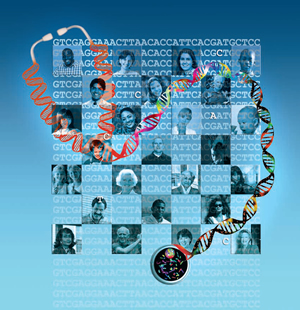Last updated: February 29, 2012
2011 News Feature Funding Now Available For New Phase Of Nhgri Largescale Sequencing Program
Applicants Wanted:
Funding Now Available for New Phase of NHGRI Large-Scale Sequencing Program

Applications are due March 3, 2011, and awards for up to four years of funding will be made in the fall of 2011.
Over the last decade, the NHGRI Large-Scale Sequencing Program has been an engine for historic scientific discovery. In addition to successfully completing the human genome sequence, the program has also sequenced the genomes of bacteria, fungus, mice, rats and chimpanzees, humans' closest living relative. Sequencing the genomes of these organisms provides researchers critical insights into human biology.
The program has provided researchers with resources to better understand DNA changes in health and disease. These include detailed maps of genetic variation, efforts to identify the parts of the genome that affect the function of genes and medical sequencing projects to uncover genome changes that lead to inherited disease and common diseases such as cancer. Thanks to more efficient and cheaper next generation sequencing methods, the program has also contributed a great deal to understanding the human microbiome, the genomes of the microbes that live in and on the human body and changes in the epigenome, chemical marks that contribute to how the human genome may function and contribute to disease.
"We still have much to learn. These grants target efforts to understand the genomic basis for disease and ways to make sequence data relevant to individual patients and their doctors," said Adam Felsenfeld, Ph.D., program director for NHGRI's Large-Scale Sequencing Program. "At the same time, the program will continue to define state-of-the-art, large-scale sequencing and be a major contributor to the knowledge base that scientists need to make future advances in biomedicine and basic biology."
Currently, NHGRI's Large-Scale Sequencing Research Network, a major component of the sequencing program, is comprised of three sequencing centers: the Broad Sequencing Platform, The Broad Institute, Cambridge Mass.; the Human Genome Sequencing Center, Baylor College of Medicine, Houston; and The Genome Center, Washington University School of Medicine, St. Louis.
NHGRI has issued Request for Applications (RFA) for the Large-Scale Sequencing Program in four areas:
- Three awards will be made to Large-scale Genome Sequence and Analysis Centers, which will address the genomic basis of complex disease. During the next four to five years, for example, such centers will sequence thousands of human genomes from individuals in specific disease cohorts and continue efforts to catalog all the genetic mutations involved in cancer. The Genome Sequencing and Analysis Centers RFA is available at Genome Sequencing and Analysis Centers (U54) [grants.nih.gov].
- Up to two centers for Mendelian disorders will be established to find genes responsible for the majority of rare, single-gene (Mendelian) disorders. It is now feasible to find these genes located in the one percent of the genome that code for proteins, known as the exome. The center(s) will identify appropriate samples in the research community, obtain the proper informed consent for genomic sequencing and coordinate analysis efforts among disease research communities. The Mendelian Disorders Genome Centers RFA is available at Mendelian Disorders Genome Centers (U54) [grants.nih.gov].
- Clinical Sequencing Exploratory Research Projects will be investigator-initiated efforts that apply what has been learned from NHGRI medical sequencing activities to the care of individual patients. This program will stimulate the use of DNA sequence information in the clinic to bridge the gap between discovery and patient care. The Clinical Sequencing Exploratory Research RFA is available at Clinical Sequencing Exploratory Research (U01) [grants.nih.gov].
- The Informatics Tools for High-throughput Sequence Analysis funding opportunity will support the creation of robust, well-documented and well-supported computer software programs that act as informatics tools to analyze DNA sequence data. The biomedical research community needs new tools to overcome bottlenecks they encounter while analyzing genomic data. There are two RFA's for Informatics Tools for High-Throughput Sequencing Analysis, one for academic institutions and one for small businesses. They are available at Informatics Tools for High-Throughput Sequence Data Analysis (U01) [grants.nih.gov] and Informatics Tools for High-Throughput Sequence Data Analysis (SBIR) (R43/R44) [grnats.nih.gov].
The shared deadline to apply for the RFAs above is March 3, 2011.
Last Reviewed: February 29, 2012
